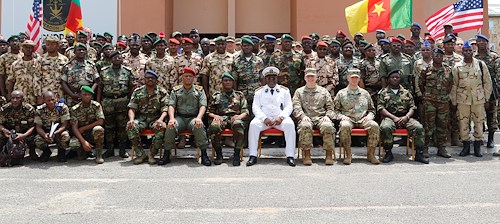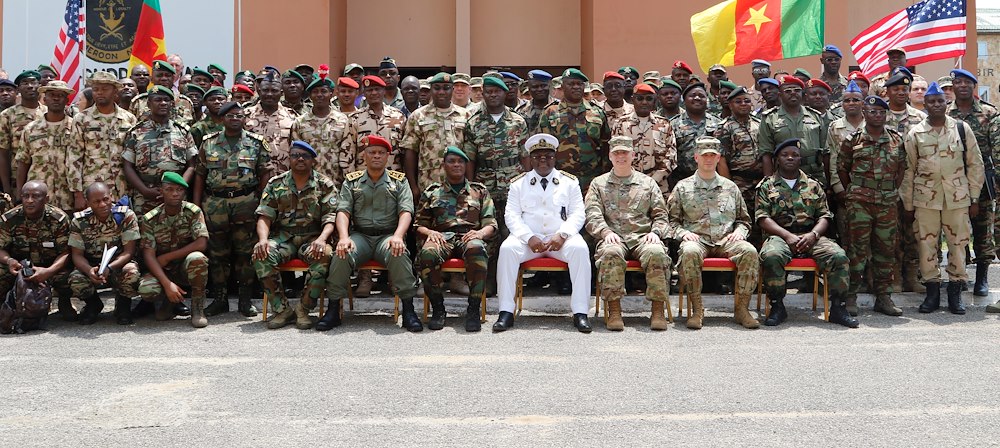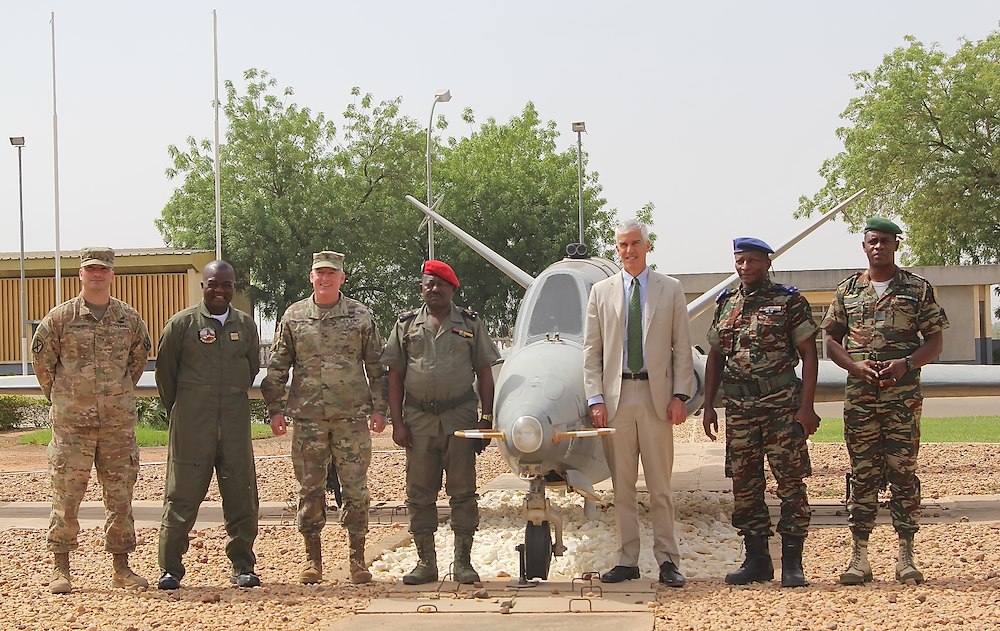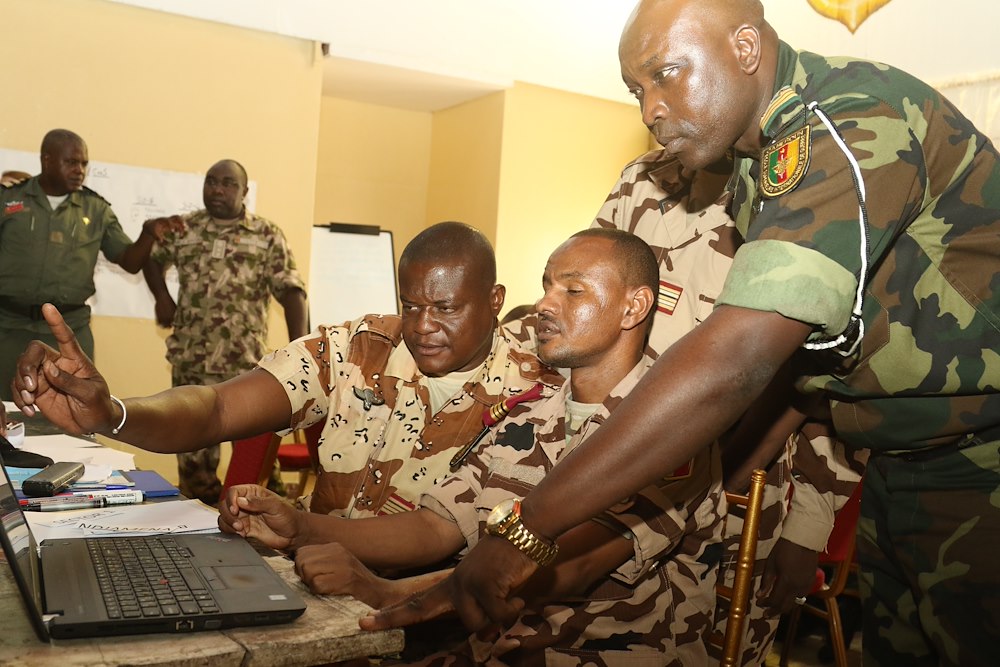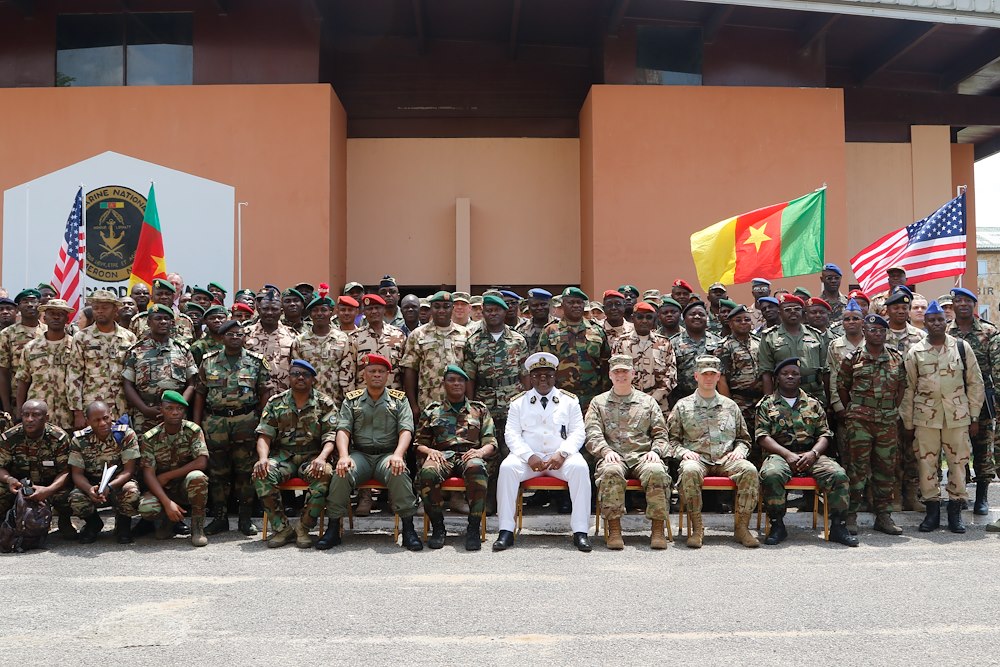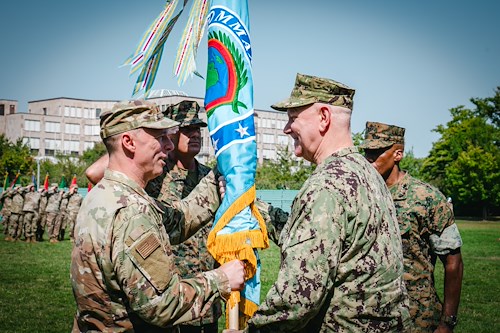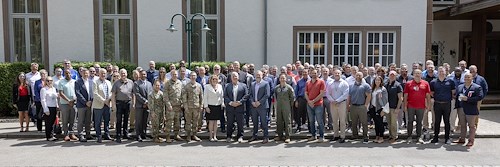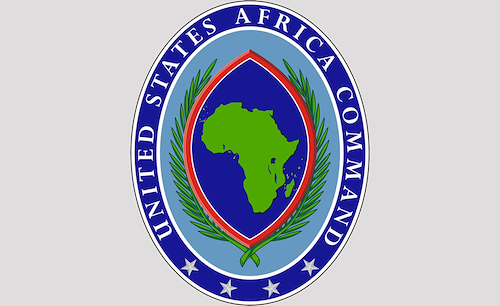Gallery contains 8 images
×
Photo 1 of 8
United States Africa Command Image
Over 100 participants including a support staff from United States Army Africa comes together for Unified Focus 2018, in Douala, Cameroon on March 12, 2018. Unified Focus is a week-long event to learn best practices from rule-of-law to countering improvised explosive devices. Strengthening partnerships by educating each other on information operations, strategic messaging, civilian protection, soldier resiliency and how to properly reintegrate and disarm defectors.
Photo by: Pfc. Angelica Mendez
Photo 2 of 8
VIP Visit to Cameroon Hospital
Peter Barlerin, United States Ambassador to Cameroon and Brig. Gen. Eugene J. LeBoeuf acting commanding general for U.S. Army Africa, visit Contingency Location Garoua, Cameroon March 15 and pose for a photo with Cameroonian Military leaders. Barlerin and LeBoeuf later visit the Garoua Regional Hopital where the USARAF Medical Readiness Training Exercise Team assist with medical expertise. TF Darby serve members at CL Garoua, are serving in a support role for the Cameroonian Military’s fight against the violent extremist organization Boko Haram.
Photo by: Staff Sgt. Christina Turnipseed
Photo 3 of 8
Practical Exercise
Members of the Unified Focus 2018 training audience participate in a practical exercise following morning academics covering Transition to Civilian Security, Vigilance Groups and Violent Extremist Organizations in Douala, Cameroon, March 13, 2018. Unified Focus 2018 is a joint, multinational staff exercise, field training exercise and , medical readiness training exercise brining military partners of the Lake Chad Basin commission troop contributing countries together to increase interoperability, and coordinate regional counter terrorism operations.
Photo by: Staff Sgt. Joshua Tverberg
Photo 4 of 8
United States Africa Command Image
Brig. Gen. William Prendergast, U.S. Army Africa Deputy Commanding General, participates in an interview with Cameroonian media following the opening ceremony for Unified Focus 2018 in Douala, Cameroon, March 12, 2018. Unified Focus 2018 is a joint, multinational staff exercise, field training exercise and , medical readiness training exercise brining military partners of the Lake Chad Basin commission troop contributing countries together to increase interoperability, and coordinate regional counter terrorism operations.
Photo by: Staff Sgt. Joshua Tverberg
Photo 5 of 8
United States Africa Command Image
Capt. Mark Starchman, U.S. Army Africa operational law attorney, instructs a class on the law of armed conflict during the academics portion of Unified Focus 2018 in Douala, Cameroon, March 12, 2018. Unified Focus 2018 is a joint, multinational staff exercise, field training exercise and , medical readiness training exercise brining military partners of the Lake Chad Basin commission troop contributing countries together to increase interoperability, and coordinate regional counter terrorism operations.
Photo by: Staff Sgt. Joshua Tverberg
Photo 6 of 8
United States Africa Command Image
Brig. Gen. William Prendergast, U.S. Army Africa Deputy Commanding General, gives remarks during the opening ceremony for Unified Focus 2018 in Douala, Cameroon, March 12, 2018. Unified Focus 2018 is a joint, multinational staff exercise, field training exercise and , medical readiness training exercise brining military partners of the Lake Chad Basin commission troop contributing countries together to increase interoperability, and coordinate regional counter terrorism operations.
Photo by: Staff Sgt. Joshua Tverberg
Photo 7 of 8
Unified Focus 2018
Over 100 participants including a support staff from United States Army Africa comes together for Unified Focus 2018, in Douala, Cameroon on March 12, 2018. Unified Focus is a week-long event to learn best practices from rule-of-law to countering improvised explosive devices. Strengthening partnerships by educating each other on information operations, strategic messaging, civilian protection, soldier resiliency and how to properly reintegrate and disarm defectors.
Photo by: Spc. Angelica Mendez
Photo 8 of 8
United States Africa Command Image
Participants observe the opening ceremony for Unified Focus 2018 in Douala, Cameroon, March 12, 2018. Unified Focus 2018 is a joint, multinational staff exercise, field training exercise and , medical readiness training exercise brining military partners of the Lake Chad Basin commission troop contributing countries together to increase interoperability, and coordinate regional counter terrorism operations.
Photo by: Staff Sgt. Joshua Tverberg
U.S. Army Africa partnered with Cameroonian Defense Forces to conduct Unified Focus 2018, a three-part multinational exercise here and in Garoua, March 12-16.
The exercise brought central African countries bordering the Lake Chad basin together for military academics and practical exercises. Simultaneously, U.S. and Cameroonian soldiers participated in Unified Focus’s field training exercise to learn combat lifesaving and counter-improvised explosive device tactics. Meanwhile, the exercise’s third effort brought surgeons from both nations to cross-train at a medical readiness training exercise in Garoua.
“Unified Focus is about partnership,” said Brig. Gen. William J. Prendergast, the U.S. Army Africa deputy commanding general and exercise co-host. “This week is an opportunity to gain new perspectives on common issues.”
The academics portion at the Douala Naval Base featured troops from Benin, Cameroon, Chad, Niger, Nigeria, the U.K., the Netherlands, the Italian Carabinieri and the United States. UF18 focused on countering violent extremist organizations while building security and stability in central Africa. It also integrated training on the application of the law of armed conflict and respect for the human rights of detainees while protecting civilian populations from harm.
The discussions reinforced the need for a “whole of government” approach, meaning defense departments must include their diplomatic counterparts and non-governmental agencies. For this reason, UF18 also included participants from the U.S. Department of State, U.S. Agency of International Development, United Nations Office for the Coordination of Humanitarian Affairs, International Committee of the Red Cross, the Office of Transition Initiatives, Department of State Bureau of Conflict and Stabilization Operations, and the International Organization for Migration.
“I think it’s great that USARAF has incorporated civilian agencies in this exercise,” said Jillian Christie, the U.S. State Department regional counter-Boko Haram civil military advisor. “I think that they are doing a great service to their African partners in helping to prepare them for these kinds of conflicts that are inherently civil-military in nature.
“We know that groups like Boko Haram can’t be defeated just militarily,” Christie said. “It takes a whole of government approach, meaning that military operations, military elements are working with civilian counterparts in diplomacy and in developments, because the roots of the problem are greater than can be defeated just with military operations.”
The participants attended classes and shared their experiences countering IEDs, implementing the rule of law, information operations, strategic messaging, media on the battlefield, civilian protections and how to properly reintegrate and disarm defectors.
“In just one week, we have seen soldiers and civilians from across the world come together to build partnerships, increase interoperability, readiness and capacities,” Prendergast said.
An hour drive north of Douala’s Naval Base, 25 Cameroonian Soldiers from the 31st Engineer Regiment, Garoua, learned hands-on techniques from U.S. Army explosive ordnance disposal and civil affairs professionals. EOD Soldiers from the U.K., Germany and Nigeria observed demonstrations by the 83rd Civil Affairs Battalion, stationed at Fort Bragg, North Carolina, and the 764th EOD Ordnance Company, stationed at Fort Carson, Colorado.
“We are training these soldiers because the threat they face is real. Violent Extremist Organizations have more IEDs,” said 1st Lt. Katlin Vanwye platoon leader for the 764th Ordnance Company and the officer in charge of U.S. Army Africa’s five-week course in Cameroon on how to defend against IEDs. “We want to build their capabilities to defend against IEDs. We want to spread our knowledge and give them the techniques we have learned over time in Afghanistan and Iraq,” Vanwye said.
The field exercise culminated in a sizable display of explosives. The training team split three kilograms of Semtex ordnance, 50 feet of detonation cord and five blasting caps into small packages. Each package was built and detonated to show trainees how much damage minimal explosives can make using water-bottle charges or clearing surface area for mine detection.
Meanwhile, approximately 750 miles north near the Lake Chad Basin, a team of U.S. Army medical professionals joined Cameroonian doctors, nurses and medics to share best medical practices for combat and non-combat injuries. The medical readiness training exercise, or MEDRETE, gave the U.S. team an opportunity to rehearse their skills in a new environment using different resources. The team worked side-by-side with their Cameroonian counterparts using local equipment for critical and highly technical medical operations.
MEDRETEs are designed to give U.S. Army surgeons a chance to operate without the advanced machinery available in hospitals. Surgeons deploying to combat zones will likely not have the same setup they have elsewhere. MEDRETEs build readiness because they force the medical teams to hone their skills in forward-deployed environments with limited resources.
Although the main purpose of a MEDRETE is to increase U.S. Army medical readiness, various positive outcomes surface throughout execution. The Cameroonian medical professionals offered new techniques U.S. medical professionals wouldn’t have ordinarily learned during their stateside medical school. Past MEDRETEs have brought long-term relationships between surgeons who digitally share new practices long after the exercise’s execution.
Unified Focus 2018 is the sequel to 2017’s Unified Focus also located in Douala. At the end of the UF18 exercise, much of the feedback included rapid discussion between familiar faces, skipping small talk to begin tactical training. Participants concluded that past relationships helped bring success to the week’s mission. The participants speculated that if familiar faces and steadfast partnerships bring success to training exercises, they may also bring success to real-world operations.

